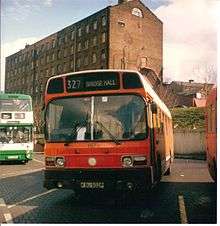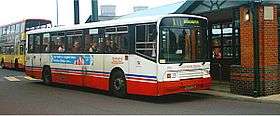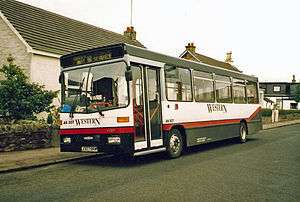GM Buses
|
| |
|
Preserved GM Buses in September 2011 | |
| Parent | Greater Manchester Passenger Transport Executive |
|---|---|
| Founded | 1986 |
| Ceased operation | 1994 |
| Service area | Greater Manchester |
| Service type | Bus operator |
GM Buses[1] was the main bus company serving the ten metropolitan districts of Greater Manchester in North West England. The company was formed in 1986 by Greater Manchester Passenger Transport Executive. In December 1993, it was split into GM Buses North and GM Buses South in order to increase competition for services in the area, before they were sold to FirstGroup and Stagecoach respectively.
History
.jpg)

%2C_SELNEC_40_event_(3).jpg)
%2C_2010_AMTM_Metrobus_event.jpg)
See here for a timeline overview of transport in Manchester.
The Transport Act 1968 resulted in several bus companies run by local authorities around Greater Manchester merging to create a central organisation. It consisted of companies operating in the following areas:
- Ashton-under-Lyne
- Bolton
- Bury
- Leigh
- Manchester
- Oldham
- Rochdale
- Salford
- Stalybridge, Hyde, Mossley & Dukinfield (Operated by the SHMD Joint Board)
- Stockport
- Wigan
The new central organisation was named SELNEC, the South East Lancashire North East Cheshire Passenger Transport Executive. The SELNEC catchment area would eventually become Greater Manchester. SELNEC introduced a standard livery of orange and white with the company split into three zones, Northern, Central and Southern.
In 1974, the Local Government Act 1972 changed the administrative areas, and the county of Greater Manchester was created. As a result, SELNEC was renamed to Greater Manchester Transport. In 1981,[2] a new livery was adopted of orange, brown and white. Also in the same year, Lancashire United Transport, based in Atherton, was absorbed into Greater Manchester Transport.
In 1986, deregulation was introduced to bus services and Greater Manchester Transport was split into two. The management of service information and tendering, bus stations and stops would be run by Greater Manchester Passenger Transport Executive (GMPTE). The bus operation would be named Greater Manchester Buses or GM Buses as it is commonly known. Deregulation also saw competition introduced on several routes run by GM Buses.
The competing companies included Bee Line Buzz Company, which ran several services along routes across the Greater Manchester area; Wall's and Finglands Coachways, which introduced several services along the Wilmslow Road corridor; and Bluebird Bus & Coach and Citibus Tours, which launched several routes in the North Manchester area. A lot of the companies that tried to compete with GM Buses failed, with most going out of business and some being taken over by GM Buses. Some companies that did succeed included Bluebird Bus & Coach, who ran several services between Ashton-under-Lyne and Manchester, until they were bought out by GM Buses' future incarnation, Stagecoach Manchester,[3] along with Mayne Coaches, who operated until 2006.[4]
On 31 December 1993, GM Buses was split,[2][5] as the Government felt that they had a monopoly of bus services in the Greater Manchester area and wanted to increase competition. GM Buses was split into two separate companies, GM Buses North[6] and GM Buses South.[7] It had been hoped by splitting the companies up, GM Buses North and GM Buses South would compete against each other. However, as their names would suggest, the two companies would mainly stay in their respective operating areas.
Prior to the formation of the North/South GM Buses companies Merseyside's dominant bus company MTL was in a phase of expansion and turned its attention to Greater Manchester. In the summer of 1993, MTL Manchester began operations from a depot in Miles Platting and added an extensive network of new/copycat services to Manchester's already hotly contested bus market.
In October 1993, the Merseybus depot in St Helens was rebranded Lancashire Travel and a further series of new/copycat services were introduced in the Wigan, Leigh, Bolton, Salford and North Manchester areas that Merseybus/MTL had been gradually increasing its profile in since the late 1980s. Finally around 1993/94, MTL purchased Bolton Coachways and used their fairly substantial minibus network to perhaps further strengthen their position in the town against GM Buses North.
MTL's incursions into Greater Manchester sparked a bus war with GM Buses and predictably they retaliated with new services on Merseyside. At first route 79 (Croxteth-Liverpool City Centre) - one of Merseybus's most profitable routes, saw high frequency GM Buses operation from September 1993 perhaps as a means to discourage further MTL expansion in Greater Manchester.
In the spring of 1994, GM Buses South formed Birkenhead & District from a depot at Cleveland Street in Birkenhead's docklands. The vehicles used a light blue and cream livery that had slight echoes to a darker blue version used by Birkenhead Transport and many of MTL's profitable services on the Wirral saw competition from Birkenhead & District. GM Buses North almost besieged by MTL's Lancashire Travel operation began further operations in Liverpool, Kirkby, Formby and Southport and also opened a new depot this time in Bootle to assist its Atherton and Wigan depots in the operation of these new services on Merseyside. Furthermore, some GMPTE "standard" Leyland Atlanteans and Daimler Fleetlines originally sold by GM Buses to Yorkshire Rider in 1987/88 were re-acquired by GM Buses North for use at the new depot at Bootle.
However, by the summer of 1995, both MTL and GM Buses North/South were making substantial losses. A controversial gentleman's agreement was therefore signed between the three companies in June 1995, which saw MTL pull out of much of Greater Manchester - with the exception of services linking St Helens with Leigh and Wigan, and GM Buses North/South completely withdrawing from Merseyside including the long established GM Buses North routes 34 (Liverpool-St Helens-Leigh-Manchester) and 320 (Liverpool-St Helens-Wigan) which had existed for decades and had origins with the Lancashire United operation.
In the first quarter of 1996, both GM Buses companies were sold. GM Buses North was purchased by FirstBus and rebranded as Greater Manchester Firstbus with a red livery. By 1997, it would be rebranded again as First Manchester and the corporate FirstGroup livery adopted. GM Buses South was purchased by Stagecoach and rebranded as Stagecoach Manchester.
In 2005, the GM Buses name was revived by UK North for use on its Manchester operations.
References
- ↑ Companies House extract company no 1992869 Greater Manchester Buses Limited
- 1 2 GM Buses Group Museum of Transport Greater Manchester
- ↑ Stagecoach agrees 2m Bluebird deal The Herald 8 November 2012
- ↑ Stagecoach starts Mayne integration Bus & Coach Professional 30 January 2008
- ↑ GMT Beyond
- ↑ Companies House extract company no 2818607 First Manchester Limited formerly Greater Manchester Buses North Limited
- ↑ Companies House extract company no 2818654 Greater Manchester Buses South Limited
External links
- Greater Manchester Transport & Beyond Selnec Preservation Society
- Greater Manchester's Museum of Transport
 Media related to GM Buses North at Wikimedia Commons
Media related to GM Buses North at Wikimedia Commons Media related to GM Buses South at Wikimedia Commons
Media related to GM Buses South at Wikimedia Commons
%2C_2011_Trans_Lancs_rally_(2).jpg)

